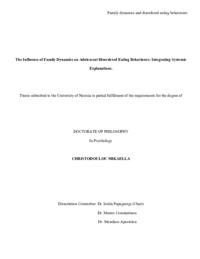- Christodoulou, Mikaella
- School of Humanities and Social Sciences
- Department of Social Sciences
- 2020
- English
- 168 pages
- Papageorgi, Ioulia
- Adolescents | Disordered eating | Eating behaviours | Family dynamics | Parenting | Systemic theory
- Social science -- Psychology
- Original: Unic - Rules: RDA
-
-
Numerous studies have tried to capture how parenting contributes to the development of disordered eating or the presence of Eating Disorder (ED) pathology within family members. There has been limited research combining different angles of family dynamics in order to explain the presence, possibility of early intervention, and prevention of EDs, in adolescence. The present study began with the premise that parents may have a crucial role in predisposing their children to EDs development. The study consisted of two phases. In Phase I, three hundred and twenty-seven (327) adolescents responded to a series of self-administered questionnaires (EAT-26, RADS-2, SCARED, PBI, PAQ, FACES-III, PACS) aiming to investigate how family dynamics influence may affect eating attitudes. In Phase II, parents of children who rated high in the EAT-26 questionnaire (indicating the presence of disordered eating pathology) were allocated into two groups. The experimental group consisted of 11 parents and received a series of five psychoeducation seminars. The sessions focused on explaining the background and context of EDs, alongside with an emphasis in teaching ideal parenting behaviours and healthy parent-child interactions. The control group consisted of 10 parents and received a series of five psychoeducation seminars focusing on providing only information about EDs background. Results from Phase I suggested that female adolescents were more likely to experience problematic eating behaviours, with a specific tendency to evoke more dieting behaviours. Stressful life events were more likely to provoke disordered eating behaviours in both genders. High levels of disordered eating attitudes were associated with enmeshed cohesion and authoritarian parenting styles. Gender, exercise, therapy, BMI, and cohesion predicted disordered eating pathology. Findings from phase II showed that parents in the experimental group reported decreased levels of disordered eating, improved parenting, and healthier cohesion and adaptability structure after psychoeducation compared to the control group
which showed only decreased disordered eating behaviours. The study suggested that family dynamics in the form of parenting styles and family structures might predispose children in developing EDs. Enmeshed boundaries and authoritarian parenting style increase the likelihood of disordered eating. These parenting parameters are best to be avoided by early prevention/intervention primarily in the level of parents.
-
The Influence of Family Dynamics on Adolescent Disordered Eating Behaviours: Integrating Systemic Explanations.
Main Files
 Full text
Full text
Description: The Influence of Family Dynamics on Adolescent Disordered Eating Behaviours. Integrating Systemic Explanations.pdf (pdf) Book Reader
Size: 2.8 MB

